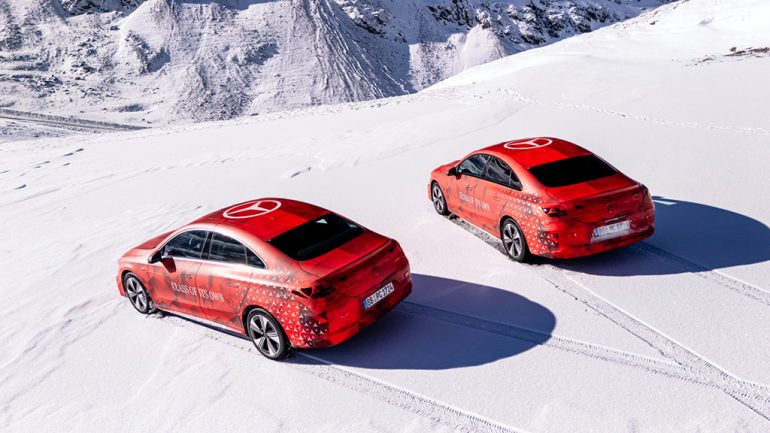Mercedes-Benz Shifts Gears as International Auto Business Rebalances Combustion and Electrical Ambitions : Automotive Addicts

The automotive {industry} is experiencing a pivotal shift, with Mercedes-Benz turning into the most recent main participant to recalibrate its technique amid evolving world market dynamics. In a transfer that alerts a broader industry-wide recalibration, the German luxurious automaker introduced a renewed concentrate on combustion engine autos whereas retaining electrical car (EV) improvement in its sights. This balancing act displays a rising sentiment throughout the sector as carmakers adapt to financial pressures, fluctuating shopper demand, and altering political landscapes—notably below the brand new U.S. administration.
Mercedes-Benz’s Strategic Reset: Extra Engines, Fewer Guarantees
On February 20, Mercedes-Benz revealed plans to launch 19 new combustion engine fashions alongside 17 battery-electric autos by 2027. This pivot underscores a rising realization that the {industry}’s transition to electrical energy could require extra time and adaptability than initially anticipated. The shift comes after Mercedes-Benz skilled a big decline in EV gross sales—down by 1 / 4 in 2023—whereas its combustion fashions continued to drive the majority of its income.
The automaker additionally introduced aggressive cost-cutting measures, together with a ten% discount in manufacturing prices by 2027 and a 20% minimize by 2030. With earnings anticipated to drop additional in 2025 following a 30% hunch final yr, Mercedes-Benz is seeking to protect profitability by doubling down on its high-margin, top-end combustion fashions.
“We aren’t abandoning our value-over-volume technique,” CFO Harald Wilhelm reassured buyers, emphasizing that conventional combustion engine automobiles stay a vital revenue driver.
A Broader Shift within the Business’s Considering
Whereas Mercedes-Benz’s technique would possibly seem to be a retreat from electrification, it mirrors a broader recalibration occurring throughout the worldwide automotive panorama. Automakers are more and more recognizing that the street to an all-electric future is extra complicated than anticipated. Financial uncertainties, provide chain challenges, and uneven charging infrastructure have all tempered the as soon as speedy push towards EVs.
Including to the complexity is the political panorama in the USA. The Biden administration had championed electrification with tax incentives and environmental mandates, however with president Trump’s current strikes, the {industry} is bracing for potential shifts. Trump has criticized electrical car insurance policies and threatened tariffs on imported automobiles, prompting producers like Mercedes-Benz to localize manufacturing in China and the U.S. to hedge towards commerce uncertainties.
This political uncertainty has prompted automakers to hedge their bets. At the same time as manufacturers like Ford, Basic Motors, and Volkswagen proceed investing closely in electrical platforms, they’re concurrently revisiting their inner combustion engine (ICE) lineups. Shoppers, particularly in key markets like North America, proceed to favor gasoline-powered SUVs and vehicles, driving house the necessity for a dual-track method.
Balancing Innovation and Actuality
Mercedes-Benz’s transfer just isn’t an abandonment of electrification however moderately a recalibration. The corporate’s plan to introduce 17 new electrical fashions by 2027 alerts that it stays dedicated to future EV progress. Nevertheless, the automaker is adopting a extra pragmatic stance, acknowledging that profitability and buyer demand nonetheless closely favor combustion fashions—notably within the luxurious section.
This pragmatic method is more and more turning into the {industry} norm. Ford just lately delayed the manufacturing of some electrical vehicles, whereas Basic Motors scaled again its EV manufacturing targets. Even Tesla, the worldwide EV chief, has proven indicators of slowing progress, going through growing competitors from Chinese language manufacturers like BYD and mounting stress to chop costs.
China and the Premium Market Squeeze
For Mercedes-Benz, China stays a crucial battleground. The corporate’s efficiency within the area fell brief in comparison with rivals, with BMW outperforming due to stronger EV gross sales. Mercedes-Benz goals to regain its footing with out participating in what CTO Markus Schaefer referred to as “irrational” worth wars—a reference to aggressive worth cuts by Tesla and home Chinese language automakers.
The posh section additionally faces headwinds. Whereas Mercedes-Benz continues to prioritize high-margin, low-volume gross sales, the technique has come below scrutiny as financial uncertainties weigh on premium automobile consumers. Buyers are watching carefully to see whether or not this method can climate the storm or if changes will likely be crucial.
What Lies Forward
Mercedes-Benz’s recalibration just isn’t an remoted occasion however a part of a broader {industry} development. Automakers are navigating a fragile balancing act: advancing towards electrification whereas making certain that their combustion engine choices stay sturdy and worthwhile. The shift highlights the complexities of the transition—removed from a straight path, it’s a winding street formed by shopper preferences, geopolitical tensions, and financial realities.
For customers, this implies extra alternative within the coming years. Whether or not you like the traditional roar of a high-performance V8 or the silent rush of an electrical luxurious sedan, automakers like Mercedes-Benz are making certain that each choices stay firmly on the desk. The way forward for driving will doubtless be a mix of each worlds—the place combustion and electrical coexist, no less than for the foreseeable future.
As the worldwide automotive {industry} recalibrates, Mercedes-Benz’s technique displays a broader actuality: the combustion engine just isn’t fading into obscurity simply but. With the U.S. political panorama probably shifting and world market pressures mounting, automakers are hedging their bets—embracing electrification whereas retaining one foot firmly planted of their combustion-powered roots. For now, the way forward for the auto {industry} just isn’t electrical or combustion—it’s each.
FOLLOW US TODAY:





